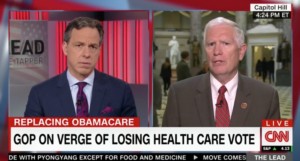Elizabeth Preza, - The Raw Story
Stephan: In the pantheon of Republican legislators, Mo Brooks of Alabama stands out for his shallowness, willful ignorance, and lack of compassion. But I will let him speak for himself.

Credit: Jake Tapper of CNN and Representative Mo Brooks (R-AL)
Credit: CNN
GOP Rep. Mo Brooks (R-AL) on Monday argued against a health care plan that protects people with pre-existing conditions, insisting “people who lead good lives’ and “have done the things to keep their bodies healthy” should received reduced costs for healthcare.
Trump vowed to protect people with pre-existing conditions in an interview with Bloomberg News on Monday. “I want it to be good for sick people. It’s not in its final form right now,” the president said. “It will be every bit as good on pre-existing conditions as Obamacare.”
Republicans’ first attempt to pass an Obamacare replacement plan failed in a dramatic fashion in March after moderate Republicans refused to support a bill that didn’t include those protections.
In an interview with Brooks, CNN’s Jake Tapper noted the new House GOP bill fails to deliver on the president’s promise.
“This new legislation would allow states to opt-out, and allow insurance companies to refuse to sell insurance to people with pre-existing conditions, as long as […]
2 Comments
Samanth Subramanian , - WIRED
Stephan: Water is destiny. The issue is not is change coming? Rather it is how different societies will prepare and respond to what is occurring. In the U.S. I don't see sufficient preparation for the oncoming reality, and I think this is the 30 year out future for cities like Las Vegas, Phoenix, Tucson, and Albuquerque.

As groundwater wells run dry, the task of supplying Bangalore’s residents and office parks has been taken up by privately operated tanker trucks.
Credit: Mahesh Shantaram
On the outskirts of Bangalore one morning last summer, a sullen young man named Manjunath stood high atop a cocoa-colored 1,850-gallon tanker truck, waiting for its belly to fill with water. The source of the liquid was a bore well, a cylindrical metal shaft puncturing hundreds of feet down into the earth. An electric pump pulled the water up from the depths and into a concrete cistern; from there, a hose snaked across the mud and weeds and plugged into Manjunath’s truck. As the water gushed into the tanker, a muffled sound emerged, like rain on a tin-sheet roof.
Once the tank was full, Manjunath disconnected the hose, climbed down, and settled into the truck’s cab. Then he drove out through a web of newly tarred back streets in the suburb of Whitefield. He passed rows of half-finished buildings, still gray from raw cement, and […]
No Comments
Jon M. Jachimowicz, Elke U. Weber, and Jaideep Prabhu, - Quartz
Stephan: Social outcome data shows us how to end poverty. But to enact it requires thinking of the world in another way; one which makes wellbeing the goal. Here is a report of the kind of data I mean. We know what works. That's not the issue. The Theorem of Wellbeing is very clear. As this report illustrates wellness is more efficient, more effective, more productive, easier to implement, nicer to live under and, cheaper.

Credit: Reuters/Mohammad Ponir Hossain
One of the keys to success in life is learning to forego instant gratification for long-term rewards. When we stay home to work on a college essay instead of going out with our friends, or put money toward retirement savings when we could spend it on clothing and fancy meals out, we are betting that the long-term payoff will be worth the short-term sacrifice.
Troublingly, research has shown that low-income people are more likely to make short-term decisions—like borrowing at excessive rates—that make them worse-off in the long run. A 2012 study, published in Science magazine, explains that this kind of decision-making is the direct result of poverty. When we have limited resources, our brains adopt a “scarcity mindset.” All our attention is directed to figuring out how to make rent or buy enough groceries to get through the week, which means that we have a harder time making decisions that involve long-term thinking. This it even harder for people to escape the cycle of […]
No Comments
Stephan: This afternoon I went to the hardware store and standing in the parking lot looking at a table of things on sale I overheard two men, one middle-aged the other in his thirties talking about Trump, of whom they were very supportive. What they said was so bizarre to me that I realized we literally lived in different realities. "I don't see how any Christian cannot support what Trump is doing, and we have some people in our church who don't seem to get that. It's causing a lot of stress," the younger man told the older one. "Well you know the island, at this end it is a swamp of libs," the older man responded, and they both laughed.
I don't know what it is like where you live but this parallel universe situation, a manifestation of the Great Schism Trend, obviously has become a major factor in American society in my world. Here is a good essay on this trend.

Credit: Salon/Shutterstock
“Alternative facts” are bad enough, but we’re facing something far more serious: alternative worldviews in which up is down, future is past and all bets are off. Simply reacting to the most outrageous lies is not strategically smart enough. We need to work more seriously on a more comprehensive response — even as we need to become more sensitive to how far the inversions of reality have spread, and what ends they serve.
For example, the day before taxes were due,
NPR reported on an
IPSOS poll that found that a 44 percent plurality of Americans mistakenly believed that the richer pay more now than they did in 1980, when the top marginal income tax rate was 70 percent —compared to 39.6 percent today. Among Republicans, 52 percent believe this false picture, compared to just 28 percent who don’t.
Democrats, in contrast, were almost evenly split, 39 percent to 43 percent. This bizarre distortion helps explain why Republicans always push for tax cuts, and are doing […]
2 Comments
, - International Business Times
Stephan: This is where medicine is going, and it is very exciting, it is good news, but it is also part of the Homo Superior Trend, whose ethical implications we have not yet begun to discuss as a culture.

Human stem cells
Credit: Shutterstock
Ten years ago, the topic of stem cells was shrouded in mystery, but now they’re at the forefront of some of the latest innovations in biology and medicine. Stem cells have yet to change into a specific type of cell, such as a brain or skin cell. As a result, doctors can manipulate them into, well, any type of cell they want. However, the way that stem cells are being manipulated is anything but simple. Here is a run-down of five of the most fascinating stem cell innovations from the past year.
Stem Cells From Baby Teeth
Teeth are necessary for helping us chew our food, but once they fall out. they’re useless; or not? The practice of tooth saving, or cryopreserving, has gained popularity, and for good reason. New research suggests the stem cells found in the pulp of teeth could be used to help people regrow their adult teeth (rather than needing a crown or dentures), and may even have other potentially life-saving regenerative medical benefits, CNN reported.
While still in […]
No Comments















